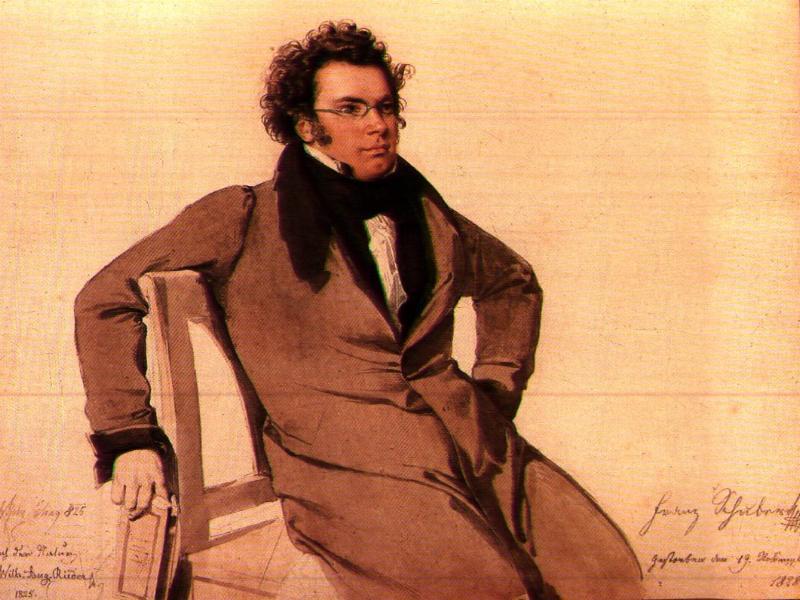
Franz Schubert (31 January 1797 – 19 November 1828), Watercolor by Wilhelm August Rieder (1825)
On January 31, 1797, the Austrian composer Franz Schubert was born. Even though his many symphonies, operas and piano pieces were not highly appreciated during his lifetime, he was posthumously praised as one of the most important composers of the Romantic era in music.
“Happy to find a true friend, happier to find a true friend in his wife.”
— Franz Schubert, Diary, 1816
Franz Schubert – Early Life of a Musical Prodigy
Franz Schubert was the 13th of 16 children to Franz Theodor and Elisabeth Schubert and began his musical studies at the age of 5. His father taught him how to play the violin and the local chapel master taught him the organ. Because of his beautiful voice he was accepted in October 1808 as a choirboy in the Vienna Hofmusikkapelle and in the Imperial Convict. His musical education increased during these years in the fields of singing and playing various instruments, to his influences belonged the music of Joseph Haydn, Wolfgang Amadeus Mozart, or Antonio Salieri.[6] Soon his talent showed itself in the composition. A piano fantasy in G major for four hands is dated April 8 – May 1, 1810. Next year followed a string quartet, another fantasy in G minor, songs and other pieces. On Sundays and public holidays, the family regularly held string quartet evenings at which his father played the cello, he himself played the viola and his brothers played the violin.
First Compositions
While his school achievements were good at first, he deteriorated over time, especially in mathematics and Latin. He rejected the possibility of extending his place in the foundation and returned to his parents’ house in October 1813. At this time he composed his Symphony No. 1 in D major. After attending a teacher training college, he became his father’s school assistant at the end of 1814, a post he held for two years, and again for a short time at the end of 1817. In addition he received lessons from Antonio Salieri until 1816 and composed productively: his first opera Des Teufels Lustschloß and his mass no. 1 in F major. In view of the increasing incompatibility of his teaching position with composing, Schubert made numerous attempts to establish himself as a composer. But the publishers refused to publish his works. In the spring of 1816 he unsuccessfully applied for the post of Kapellmeister in Ljubljana. However, his social status grew and many friends of Schubert appreciated his works and talents, organizing musical events to his honor and financing his life since he had no regular income. ‘Die Forelle‘ depicts an important song of this period.
Schubertiaden
During all this time his circle of friends grew constantly. The poet Johann Mayrhofer, whom he had met in December 1814, wrote him two libretti. Schober introduced him to the baritone Johann Michael Vogl, one of the most important singers at the Vienna Court Opera, who soon sang his songs in literary salons and thus introduced him to the public. The pianist Josef von Gahy played his sonatas and fantasies. The musical family Sonnleithner, especially their eldest son Leopold von Sonnleithner, organized musical meetings in his honor, which from 1821 were called Schubertiaden (and still take place in a similar, but also completely differently organized form).
Break Through and Health Problems
In the following years, Schubert was occupied with a few minor jobs, but basically broke after his return to Vienna. Also, the number of his musical accomplishments decreased even though he was able to develop his own style more and more. A little series of success set in, when his operas were being publicly performed and depicted a little break through for Schubert. Due to their success, he was able to publish further works, but when trying to compose further stage pieces, he failed. Also his health situation slowly began to worsen, he was known for his alcoholic excesses and later suffered from syphilis.
Schubert and the Art of the Song
Still, he managed to finish several works, like the famous song cycle ‘Die schöne Müllerin‘ from 1823. In 1827, Schubert wrote the song cycle Winterreise (D. 911), a colossal peak in art song. The works of his last two years reveal a composer increasingly meditating on the darker side of the human psyche and human relationships, and with a deeper sense of spiritual awareness and conception of the ‘beyond’. He reaches extraordinary depths in several chillingly dark songs of this period, especially in the larger cycles. Schubert spent the last years of his life writing and playing music with only modest success and passed away on November 19, 1828 at his brother’s home. In the midst of this creative activity, his health had deteriorated. The cause of his death was officially diagnosed as typhoid fever, though other theories have been proposed, including the tertiary stage of syphilis.
It was in the genre of the Lied, however, that Schubert made his most indelible mark. Prior to Schubert’s influence, Lieder tended toward a strophic, syllabic treatment of text, evoking the folksong qualities engendered by the stirrings of Romantic nationalism. Among Schubert’s treatments of the poetry of Goethe, his settings of “Gretchen am Spinnrade” (D. 118) and “Der Erlkönig” (D. 328) are particularly striking for their dramatic content, forward-looking uses of harmony, and their use of eloquent pictorial keyboard figurations, such as the depiction of the spinning wheel and treadle in the piano in “Gretchen” and the furious and ceaseless gallop in “Erlkönig“.[11]
The Misjudged Musical Genius
Franz Schubert is often seen as one of the most misjudged musical geniuses, but also one of the most important of his period. Most of his works were written independently from his success or public appearance. Concerning public performances, Schubert counted as rather shy in contrast to Mozart or Beethoven. He produced a large amount of musical works, from which only a little part was actually published. Posthumously, many further pieces were published and depicted a great success, like his Symphony No. 9, performed by Felix Mendelssohn Bartholdy in Leipzig.[3] Schubert counts as one of the founders of the romantic music, wherefore he was honored multiple times by the city of Vienna through monuments, streets, and plazas.
A feeling of regret for the loss of potential masterpieces caused by his early death at age 31 was expressed in the epitaph on his large tombstone written by his friend the poet Franz Grillparzer: “Here music has buried a treasure, but even fairer hopes.“
Chairat Chongvattanakij, Lecture on Schubert’s last piano sonata, [11]
References and Further Reading:
- [1] Biographies, pictures and lists of Schubert’s works
- [2] Franz Schubert at Britannica Online
- [3] Felix Mendelssohn – Child Prodigy of the Romantic Era, SciHi Blog, November 04, 2012
- [4] Franz Schubert Information Webpage and Biography
- [5] Franz Liszt – Rockstar of the 19th Century, SciHi Blog, October 22, 2012
- [6] Mozart’s Famous Masonic Opera – The Magic Flute , SciHi Blog, September 30, 2012
- [7] Caspar David Friedrich and the German Romanticism , SciHi Blog, September 5, 2012
- [8] Rocking the Baroque – Johann Sebastian Bach, SciHi Blog, July 28, 2012
- [9] Franz Schubert at Wikidata
- [10] Franz Schubert Timeline at Wikidata
- [11] Chairat Chongvattanakij, Lecture on Schubert’s last piano sonata, 2015, Chairat Chongvattanakij @ youtube
- [12] Schubert, Franz; Deutsch, Otto Erich (1928). Franz Schubert’s Letters and Other Writings. Translated by Savile, Venetia. A. A. Knopf.
- [13] Austin, George Lowell (1873). The Life of Franz Schubert. Shepard and Gill.
- [14] Hadow, William Henry (1911). “Schubert, Franz Peter“. In Chisholm, Hugh (ed.). Encyclopædia Britannica. Vol. 24 (11th ed.). Cambridge University Press. pp. 383–386.
- [15] The Life and Works of Johann Wolfgang von Goethe, SciHi Blog

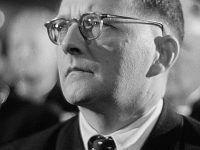
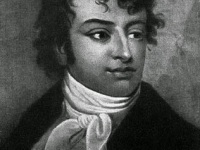
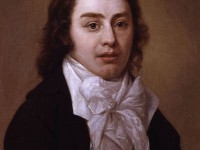
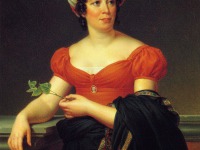

I like your blog post. Keep on writing this type of great stuff. I’ll make sure to follow up on your blog in the future.
Locksmiths Edinburgh
The world’s most romantic “How-To” website with all the information you need about preparing a romantic dinner for two!
Romantic music